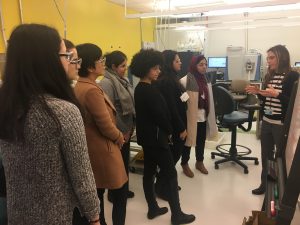Rosa Basevich, Neeru Bhagirath, Maria Mahin, Noorulain Paracha, and Christina Sarcone
In 2018, 46 companies joined Women in Technology and Entrepreneurship in New York’s (WiTNY) “winternship” program to pair undergraduate women pursuing technical majors from the City University of New York (CUNY) with internships during their winter break.

Lab tour at Pfizer in Cambridge, Massachusetts. From left: “Winterns” Maria Mahin, Rosa Basevich, Shin Ah Oh (research associate), Aisha Khoja, Christina Sarcone, Neeru Bhagirath, Noorulain Paracha, and Michelle Clasquin (lab tour guide).
WiTNY is an initiative between CUNY, Cornell Tech, and industry with the mission to facilitate, encourage, and enable a significant increase in the participation of women in both higher education and entrepreneurship in fields related to technology in the New York market. Through strategic initiatives and purposeful integration with key institutions and programs in New York City, WiTNY targets high-school girls getting ready for college, as well as undergraduate and graduate women, preparing them to secure a rewarding and lucrative position in the technology industry.
This year, Pfizer—through the women’s leadership network WOW (women owning the way)—hosted six winterns in a three-week program. The women were immersed in topics related to Pfizer’s business, with an emphasis on how technology plays a role through applications of computer science, data science, and digital media.
Rosa Basevich, Undergraduate Student, Hunter College
I am currently a junior at Hunter College, pursuing a bachelor’s of computer science and a math and German minor. As part of the winternship program, I was paired with Pfizer in the Real-World Data and Analytics Center of Excellence. I was able to get familiar with the pharmaceutical industry and Pfizer through the means of a group project.
For our group project, we tried to find solutions to combat the opioid epidemic using machine learning. Though our project was mainly research based (we could not write algorithms that would analyze trends within groups that would identify opioid abuse for lack of time and experience), it was extremely informative. During the research stage of the project, we learned about many groups that have also found solutions through machine learning to identify trends in opioid abuse.
In addition to the group project, we had individual managers in the business technology department of Pfizer. Having never taken a statistics course before, working in data analytics was both challenging and rewarding. I was introduced to the software R and was able to use regression analysis and ROC curve to interpret and quantify large data sets.
Working with Kelly (my manager) has inspired me to take a big data course and learn more about data science. I also hope to take more advanced statistics courses in my academic future. I was also surprised to see the vast technological presence Pfizer has. Seeing apps like BeLive (meant to aid patients who have fibromyalgia) and the many emerging technology products was inspiring, since it shows code working in the real world, reaching and helping many people.
Neeru Bhagirath, Undergraduate Student, Macaulay Honors College at The City College of NY
I am pursuing a biotechnology degree with a double minor in computer science and public policy at The City College of New York. I plan to use the combination of my studies to combine health care and technology to create a more accessible world.
Prior to this winternship at Pfizer Inc., I did not have much exposure to tech or business beyond college courses; however, I was able to gain an expansive overview of what measures are taken to make a pharmaceutical company successful.
Within my three weeks, I worked on a departmental project and a challenge project. The purpose of the departmental project was to create a game to promote inclusivity among the domestic and international offices, and the challenge project was to come up with a way to combine Pfizer’s core health care values and with today’s increased importance on technology and communication.
Through working on the challenge project, I learned about valuable lessons in teamwork, modern day epidemics, and—most of all—how important it is for a company to use their outreach to invoke change among the public.
Maria Mahin, Undergraduate Student, Hunter College
I am a fourth-year student at Hunter College, studying computer science with an interest in technology, education, and health care. I spent my first three years of college studying nursing, where I was able to see how technology critically shapes the way we prevent, diagnose, and treat diseases. Later, I taught myself how to program and fell in love with it. Since then, I’ve dreamed of one day using technology as a means of helping people live longer, healthier lives.
This winternship program provided an opportunity for me to learn from inspiring female leaders and see how technology and health care can be intertwined. During the three weeks of the program, I conducted research for the digital strategy team and worked with five other interns to devise a way in which Pfizer can use emerging channels of media and technology to better engage patients in their health.
What impacted me the most from my time at Pfizer was seeing firsthand the powerful role technology has in shaping patient health outcomes. From the use of wearable devices to monitor and communicate patient health information to the applications of machine learning in disease diagnosis and drug development, technology has become inseparable from health care. Specifically, my time at Pfizer has sparked my interest in data science and how analyzing increasingly massive amounts of health care data can help companies like Pfizer better understand and tailor life-changing treatments for patients.
This semester, I am taking a big data course and a machine learning MOOC (massive open online course). Moving forward, I hope to further explore this field, as well as other intersections between technology and health care.
Noorulain Paracha, Undergraduate Student, Macaulay Honors College at Brooklyn College
I am a sophomore in the Macaulay Honors Program at Brooklyn College. I am interested in combining my passion for medicine and technology. During this winternship, I was part of the Commercial Oncology Business Team. I had the ability to analyze the usability of an application and create usage cases for applications created for field representatives. Completing this task allowed me to witness how Pfizer uses technology on a daily basis to improve patient outcomes.
I was amazed to see the heavy importance placed on using data to determine what future steps needed to be taken by the company. From the different presentations we had on real-world data, I was shown the value of statistical analysis to understand the progress of a medication. Furthermore, as a group of interns, we focused on the opioid epidemic the United States faces. We created a model of an application that would help identify when a patient is at risk of addiction. This application would involve the use of machine learning that could determine how a patient may be affected by prescription opioids. By completing this project, we hoped to improve the quality of a patient’s life and lessen this national problem.
Through my experience at Pfizer, I aspire to continue to learn about the role technology has in advancing health care.
Christina Sarcone, Undergraduate Student, The City College of New York
I am currently an undergraduate sophomore student at The City College of New York, pursuing a bachelor’s degree in computer science with a pre-medical studies focus. I hope to pursue a career that will combine both interests of medicine and technology.
As a data analyst intern during the winternship, I quickly learned the importance of data science within the health care sector. I was exposed to different projects within the department, one in particular being a rerouting system for sales representatives to improve their operations. The exposure to said projects has shown me that although the headquarters is not a clinical setting, they are still able to improve the lives of others behind the scenes with the help of technology.
This opportunity was unlike any other I have experienced. I am grateful for the individuals who have dedicated their time to exposing me to the benefits and potential of data science. This internship at Pfizer has expanded my knowledge on technology within health care and proving that although data yields one result on the surface, it is the key to solving many other problems as well.




Leave a Reply